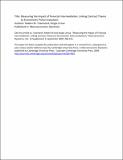Measuring the Impact of Financial Intermediation: Linking Contract Theory to Econometric Policy Evaluation
Author(s)
Townsend, Robert; Urzula, Sergio S.
DownloadTownsend_Measuring the Impact.PDF (590.5Kb)
OPEN_ACCESS_POLICY
Open Access Policy
Creative Commons Attribution-Noncommercial-Share Alike
Terms of use
Metadata
Show full item recordAbstract
We study the impact that financial intermediation can have on productivity through the alleviation of credit constraints in occupation choice and/or an improved allocation of risk, using both static and dynamic structural models as well as reduced-form OLS and IV regressions. Our goal in this paper is to bring these two strands of the literature together. Even though, under certain assumptions, IV regressions can accurately recover the true model-generated local average treatment effect, this is quantitatively different, in order of magnitude and even sign, from other policy impact parameters (e.g., ATE and TT). We also show that laying out clearly alternative models can guide the search for instruments. On the other hand, adding more margins of decision, that is, occupation choice and intermediation jointly, or adding more periods with promised utilities as key state variables, as in optimal multiperiod contracts, can cause the misinterpretation of IV as the causal effect of interest.
Date issued
2009-09Department
Massachusetts Institute of Technology. Department of EconomicsJournal
Macroeconomic Dynamics
Publisher
Cambridge University Press
Citation
Robert M. Townsend and Sergio S. Urzua (2009). MEASURING THE IMPACT OF FINANCIAL INTERMEDIATION: LINKING CONTRACT THEORY TO ECONOMETRIC POLICY EVALUATION. Macroeconomic Dynamics, 13 , pp 268-316
doi:10.1017/S1365100509090178
Version: Author's final manuscript
ISSN
1365-1005